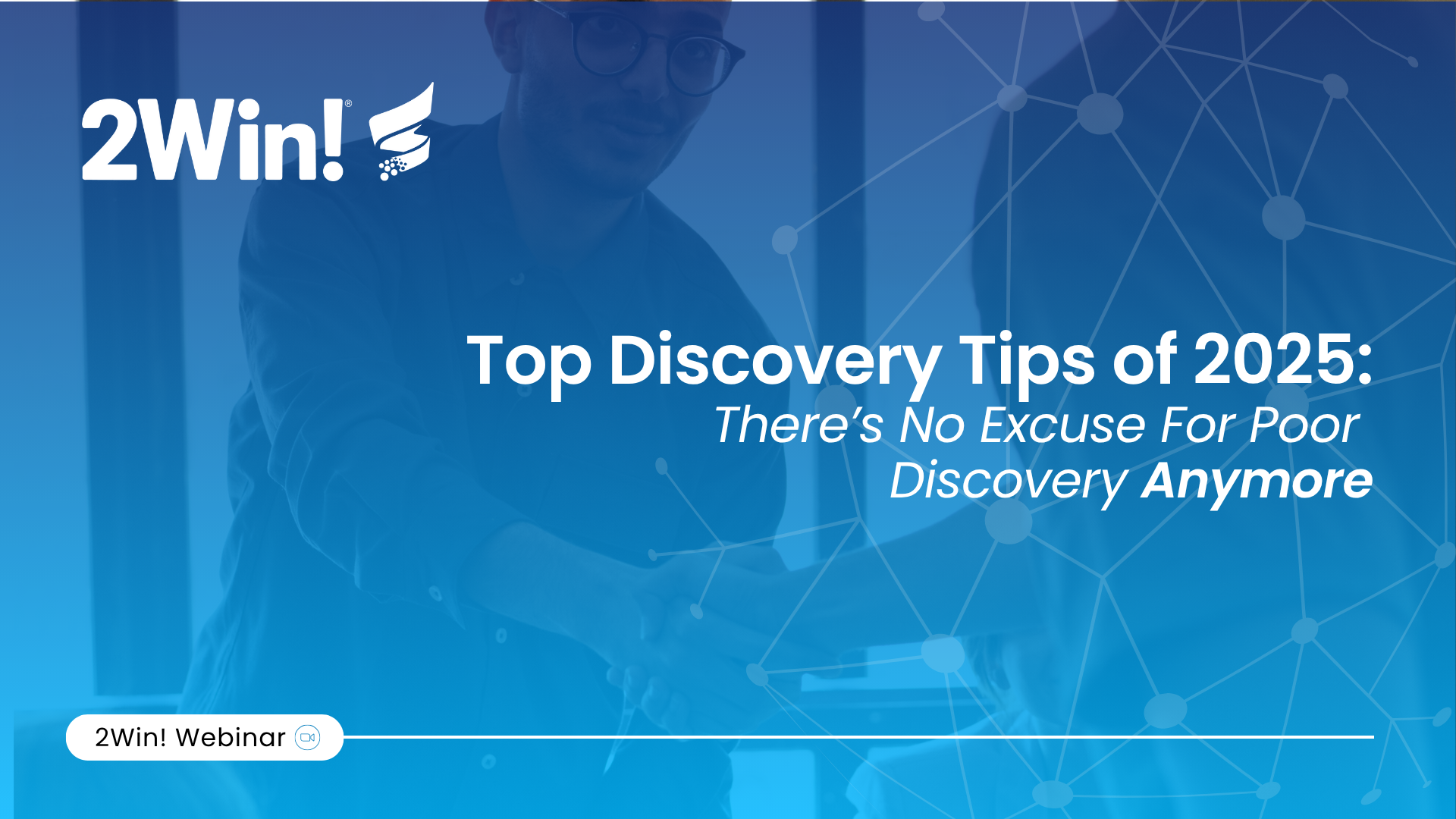Demo2Win Retrospective: What's Changed and What Hasn't in 20 Years
It’s Monday morning… but not in 2025.

The verdict is in: every buying decision is an emotional decision—just justified rationally.
That was the central insight from our recent webinar featuring an all-star panel of sales leaders: Allison Macalik (Director of Solutions at ONTIC), Chad Wilson (VP of Operations at 2Win), Chris Mabry (VP of Solutions and Partnership at Reprise), and Sam Morton (Chief Sales Officer at First Due). Together, they shared the discovery strategies that are winning deals in 2025—and why there's simply no excuse for poor discovery anymore.
Discovery isn't a single conversation or checkbox in your CRM. It's an ongoing discipline that spans three distinct phases:
Qualification: Does this deal actually fit?
Buyer motivation: What emotional and business drivers exist?
Deal shaping: How do we architect this to close?
The best teams understand that discovery is seasonal. As Chad noted, when pipeline coverage is thin, deal shaping becomes critical. When you're flooded with leads, qualification takes center stage. Smart sellers adapt their discovery intensity to match business realities.
We challenged our panelists: if you could only ask one discovery question on your next call, what would it be?
The unanimous answer? "What's your measurement of success?"
Both Sam and Chris emphasized this metric-focused approach. As Sam explained, "If we don't discover that measurement of success, we're just assuming a lot as we continue the selling journey." Chris takes it further, he builds that success metric into implementation projects and quarterly business reviews, creating a through-line from discovery to renewal.
Chad offers a complementary approach: "What's the energy behind this project?" This question reveals the political landscape—who's driving the initiative, where the power lies, and whether there's genuine momentum or just polite interest.
Here's the uncomfortable truth: technical intelligence is just table stakes. What separates elite sellers from the pack is emotional intelligence.
Chad shared a formative moment from day one of his first sales job. His VP pulled him aside and said, "The main thing you need to know is every buying decision is an emotional decision." Young, logic-driven Chad pushed back. But over time, he learned the lesson: deals are won on feelings and beliefs, then justified with spreadsheets and ROI calculations.
In today's market, where technical parity between solutions is the norm, your ability to connect specific solutions to individual human needs becomes your differentiator. As Chad put it: "If you can clearly articulate how you can help solve a challenge specific to an individual—not a persona, not a market, but an individual—you gain influence."
Discovery isn't about extraction, it's about connection. So how do you build trust quickly?
Chris's approach: Get genuinely curious about their world, not your solution. Research their industry pain points before the call. On a recent call with a hospitality client, he opened by discussing the revolving door of talent—a pain point specific to their sector. The prospect immediately felt understood.
Sam's method: Send a PAL (Purpose, Agenda, Length) document before every discovery call. It signals respect for their time and lets them reshape the conversation. One CIO told Sam, "Thank you for respecting my time. Here's what I actually want to discuss—and I'll get you meetings with my staff for the other items."
Chad's wisdom: Never ask questions they've already answered. Information that doesn't pass down the sales chain kills trust instantly. Use AI to prep, then open with, "Here's what I understand, what would you correct or add?"
Here's a paradigm shift that made the entire panel pause: when you lose a deal, don't record it as losing to "Salesforce" or "Microsoft." Record it as losing to Jim Smith from Salesforce.
Why? Because buyers don't invest in companies, they invest in people. Jim beat you. And if you frame it that way, you'll prepare differently for the next encounter. You'll study Jim's moves, his trade show presence, his demo style. You'll get personal about the competition in a way that drives improvement.
With committees expanding and internal influence spread across more roles, discovery can’t be contained to a single contact.
Top organizations are adapting by:
Engaging multiple voices across the customer team
Mapping different motivations and priorities
Connecting insights across internal AE/SE/CS functions
Treating discovery as a shared responsibility, not an individual skill
This collaborative model reduces blind spots and ensures every part of the sales process is anchored in a consistent, accurate understanding of the buyer’s needs and goals. Because here's the reality: your deal is dying in a Slack channel you don't even know exists. Multi-threading isn't optional anymore; it's survival.
Sometimes you push too hard. The prospect's body language shifts. The energy drops.
What do you do?
Chris offers a vulnerable but effective approach: call it out immediately. "It looks like we've asked too many questions. Let me explain why we do this—it helps us understand X. Let's get back to what you wanted to see."
Acknowledging the tension diffuses it. It shows you're human, you're paying attention, and you care more about their experience than your script.
Chad adds a musical insight: when mistakes happen, they usually stem from something 30 seconds earlier—not the moment itself. A prospect shared something important, and the seller missed it or glossed over it. Trust broke. Now the ground is shifting.
Every panelist is deep in AI experimentation, but there's a critical distinction emerging: efficiency vs. effectiveness.
Most teams use AI for efficiency: summarizing calls, automating notes, speeding up admin tasks. But the real opportunity? Effectiveness. Using AI to actually improve win rates.
Chad issued a challenge to the audience: most people are building individual AI assistants. The future belongs to teams that build systems of specialized agents that talk to each other—one for QA, one for competitive intel, one for product mapping, one for past-win analysis.
As he put it: "Building AI systems is no different than creating a new role, defining job requirements, and training someone to do it effectively. And it turns out, with people, that's really hard. It's also really hard with AI."
The warning? Don't scale AI until you've achieved expert-level accuracy. Mediocre AI at scale is worse than no AI at all.
Cliff from the audience asked the most practical question of the session: "What do I do when I'm stacked back-to-back and don't have time for all this prep?"
Chris: Use AI call summaries to identify what's already been asked and what the pain points are. Your number one job is to avoid asking a question twice.
Sam: Tap your partner network. Resellers, adjacent vendors, and other sellers who touch the same accounts can give you intelligence in 2 minutes that would take hours to uncover: "Don't waste time with that guy—talk to Sarah in procurement."
Chad: Lead with an insight-based question. Use AI to quickly craft a relevant industry observation, frame it as a closed-ended question, then follow up with an open-ended one. Example: "We're seeing a lot of solutions teams struggle to scale AI adoption beyond individual users. Are you seeing that too? [Yes] How's that impacting your team?"
Poor discovery in 2025 is a choice, not a constraint.
With AI agents, conversation intelligence platforms, multi-threading frameworks, and research at your fingertips, the tools exist to show up informed, ask better questions, and build trust faster than ever before.
But here's the paradox: all that technology only works if you remember the core truth, every buying decision is an emotional decision, justified rationally.
Your job isn't to extract information. It's to connect, understand, and help buyers see their situation with fresh eyes. Technology can prep you, guide you, and score you. But only emotional intelligence—the kind that treats discovery like a moment of crisis where someone needs your help—will close the deal.
So ask yourself: are you using discovery to qualify deals, or to transform them?
Because in 2025, that's the difference between winning and losing to Jim Smith.
It’s Monday morning… but not in 2025.

Sales, presales, and client success professionals are routinely confronted with objections, tough questions, and customer concerns. These situations...

At 2Win, we often say, "The only thing worse than never telling a story... is telling a bad one." Stories in a business environment should always be...